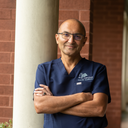How long after a total knee replacement can I have cosmetic surgery? Considering eyelid surgery.
My new knee is 5.5 months old. I know there is a higher risk of infection with invasive procedures. Would the customers antibiotics do the trick to reduce risk? I'm considering eyelid surgery and maybe getting rid of the under eye bags as well. Also, would I need help at home after surgery? I live alone. Thanks for the time you dedicate to the folks here!




